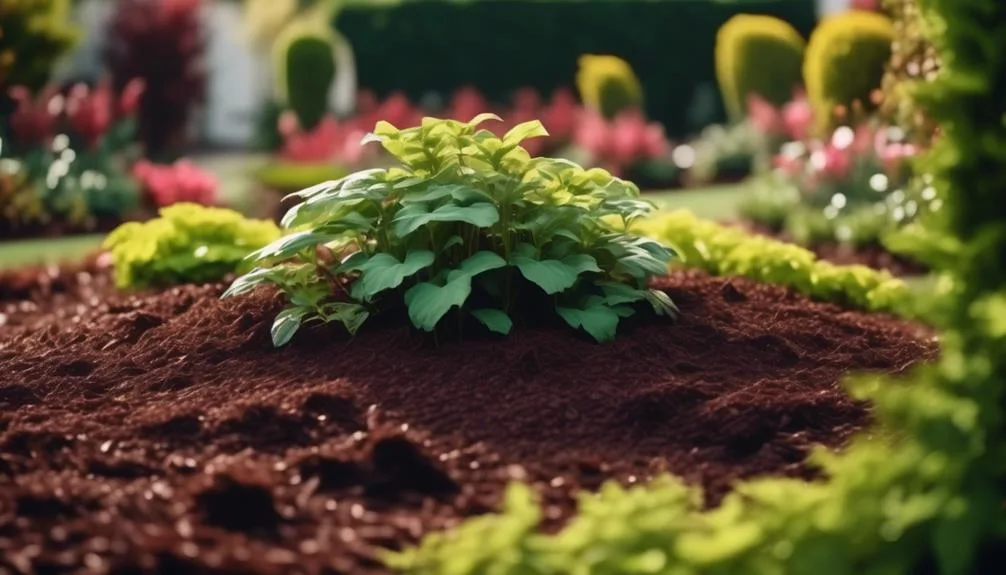Considering using redwood tree mulch in your garden?
Let's break it down.
Some say it's great for soil and weed control, while others have concerns.
Whether you're an experienced gardener or just starting out, understanding the impact of redwood tree mulch on your garden is crucial for informed decisions.
Let's explore the potential benefits and drawbacks of this popular gardening practice without getting too carried away.
Nutrient-Rich Properties
When using redwood tree mulch in your garden, you'll be thrilled to know that it possesses a bounty of nutrient-rich properties that can significantly enhance the health and vitality of your plants.
Redwood tree mulch is an excellent source of carbon sequestration, which means it helps in reducing the amount of carbon dioxide in the atmosphere. This process contributes to a healthier environment while also enriching the soil fertility.
The mulch slowly breaks down, releasing nutrients into the soil, which provides a sustainable source of nourishment for your plants. As it decomposes, it also improves the soil structure, promotes beneficial microbial activity, and helps to retain moisture.
This results in healthier, more vibrant plants with increased resistance to disease and pests. So, incorporating redwood tree mulch into your garden not only benefits your plants but also contributes to a more sustainable ecosystem.
Soil Moisture Retention
As you consider incorporating redwood tree mulch into your garden, you'll find that its ability to enhance soil fertility and promote beneficial microbial activity directly contributes to the retention of moisture, fostering an environment for healthier, more resilient plants.
Here's why redwood tree mulch is beneficial for soil moisture retention:
- Water conservation: Redwood tree mulch forms a protective barrier, reducing water evaporation from the soil and helping to conserve moisture for plant hydration.
- Soil health: By gradually breaking down, redwood tree mulch enriches the soil with organic matter, improving its structure and water-holding capacity, which is crucial for root development.
- Root development: The moisture-retaining properties of redwood tree mulch create an ideal environment for roots to thrive and access the water they need for healthy growth.
Weed Suppression
To effectively suppress weeds in your garden, redwood tree mulch offers a natural and sustainable solution. It inhibits weed growth while nourishing the soil.
This mulch forms a barrier that blocks sunlight from reaching weed seeds, preventing them from germinating and establishing. It also retains moisture in the soil, reducing the need for frequent watering and aiding in water conservation efforts.
By preventing weed growth, the mulch also minimizes competition for water and nutrients. This promotes plant health and allows your garden plants to thrive.
The natural acidity of redwood mulch can further deter weed growth, creating an environment that's conducive to the health of your plants.
With its weed-suppressing qualities and benefits for water conservation and plant health, redwood tree mulch is an excellent choice for maintaining a vibrant and flourishing garden.
Microbial Activity Enhancement
Enhancing the microbial activity in your garden's soil with redwood tree mulch not only suppresses weeds but also fosters a thriving ecosystem that benefits your plants. Here's how it works:
- Beneficial Fungi: Redwood tree mulch encourages the growth of beneficial fungi such as mycorrhizae, which form symbiotic relationships with plant roots, aiding in nutrient uptake and overall plant health.
- Soil Health: The addition of redwood tree mulch promotes a diverse and healthy microbial community in the soil. This diverse microbiome helps break down organic matter, releasing nutrients for plant uptake, and improving soil structure.
- Nutrient Cycling: The increased microbial activity facilitated by redwood tree mulch aids in the decomposition of organic matter, leading to improved nutrient cycling and availability for plants, ultimately enhancing the overall vigor and resilience of your garden.
Potential Drawbacks
Considering the potential drawbacks of using redwood tree mulch in your garden, it's important to be aware of certain factors that may impact its effectiveness. While redwood tree mulch offers numerous benefits, there are potential hazards and environmental impacts to consider before incorporating it into your garden.
| Potential Hazards | Environmental Impact |
|---|---|
| Allelopathic effects on some plants | Impact on soil pH |
| Risk of termite infestation | Carbon footprint of sourcing redwood |
| Potential for mold growth | Impact on local ecosystems |
Redwood tree mulch contains natural compounds that can inhibit the growth of certain plants due to its allelopathic effects. Additionally, the risk of termite infestation and mold growth should be considered. Moreover, sourcing redwood for mulch may have a significant carbon footprint, and its impact on local ecosystems and soil pH should not be overlooked. It's crucial to weigh these potential drawbacks against the benefits when deciding to use redwood tree mulch in your garden.
Conclusion
Incorporating redwood tree mulch in your garden offers a range of benefits. It can enrich the soil, retain moisture, suppress weeds, and promote microbial activity.
However, it is important to be mindful of its potential acidity and nitrogen depletion. Thoughtful application of redwood tree mulch can significantly enhance your garden's health and sustainability.
Consider the long-term impact on your garden's vitality as you make this natural and eco-friendly choice.

My interest in trees started when I first saw the giant sequoias in Yosemite.
I was a teenager then, and I remember thinking, “I need to learn more about this.”
That moment stuck with me.
A few years later, I went on to study forestry at Michigan Tech.
Since graduating, I’ve worked in a mix of hands-on tree care and community education.
I’ve spent over ten years helping people understand how to plant, maintain, and protect the trees in their neighborhoods.
I don’t see trees as just part of the landscape.
They are living things that make a real difference in our daily lives.
